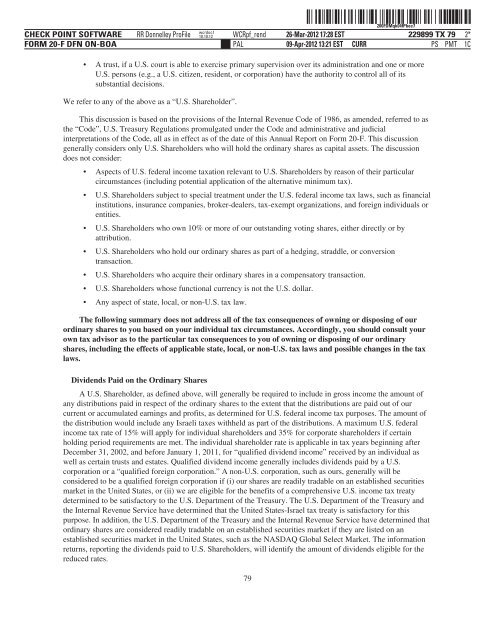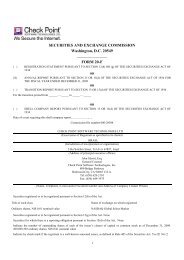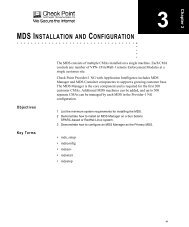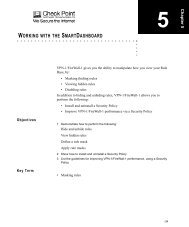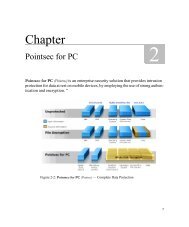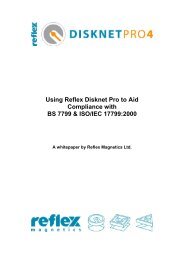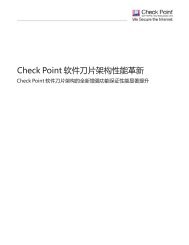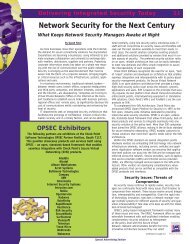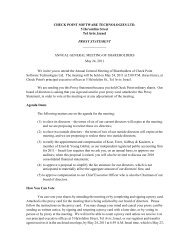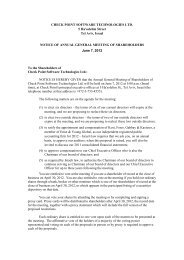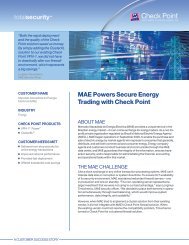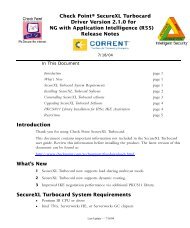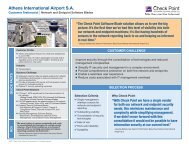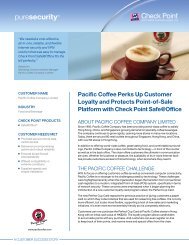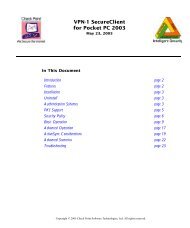printmgr file
printmgr file
printmgr file
You also want an ePaper? Increase the reach of your titles
YUMPU automatically turns print PDFs into web optimized ePapers that Google loves.
CHECK POINT SOFTWARE<br />
FORM 20-F DFN ON-BOA<br />
ˆ200FDMqk04fPbec7\Š<br />
200FDMqk04fPbec7<br />
RR Donnelley ProFile wcrdoc1<br />
10.10.12 WCRpf_rend 26-Mar-2012 17:28 EST<br />
229899 TX 79 2*<br />
PAL<br />
09-Apr-2012 13:21 EST CURR<br />
PS PMT 1C<br />
• A trust, if a U.S. court is able to exercise primary supervision over its administration and one or more<br />
U.S. persons (e.g., a U.S. citizen, resident, or corporation) have the authority to control all of its<br />
substantial decisions.<br />
We refer to any of the above as a “U.S. Shareholder”.<br />
This discussion is based on the provisions of the Internal Revenue Code of 1986, as amended, referred to as<br />
the “Code”, U.S. Treasury Regulations promulgated under the Code and administrative and judicial<br />
interpretations of the Code, all as in effect as of the date of this Annual Report on Form 20-F. This discussion<br />
generally considers only U.S. Shareholders who will hold the ordinary shares as capital assets. The discussion<br />
does not consider:<br />
• Aspects of U.S. federal income taxation relevant to U.S. Shareholders by reason of their particular<br />
circumstances (including potential application of the alternative minimum tax).<br />
• U.S. Shareholders subject to special treatment under the U.S. federal income tax laws, such as financial<br />
institutions, insurance companies, broker-dealers, tax-exempt organizations, and foreign individuals or<br />
entities.<br />
• U.S. Shareholders who own 10% or more of our outstanding voting shares, either directly or by<br />
attribution.<br />
• U.S. Shareholders who hold our ordinary shares as part of a hedging, straddle, or conversion<br />
transaction.<br />
• U.S. Shareholders who acquire their ordinary shares in a compensatory transaction.<br />
• U.S. Shareholders whose functional currency is not the U.S. dollar.<br />
• Any aspect of state, local, or non-U.S. tax law.<br />
The following summary does not address all of the tax consequences of owning or disposing of our<br />
ordinary shares to you based on your individual tax circumstances. Accordingly, you should consult your<br />
own tax advisor as to the particular tax consequences to you of owning or disposing of our ordinary<br />
shares, including the effects of applicable state, local, or non-U.S. tax laws and possible changes in the tax<br />
laws.<br />
Dividends Paid on the Ordinary Shares<br />
A U.S. Shareholder, as defined above, will generally be required to include in gross income the amount of<br />
any distributions paid in respect of the ordinary shares to the extent that the distributions are paid out of our<br />
current or accumulated earnings and profits, as determined for U.S. federal income tax purposes. The amount of<br />
the distribution would include any Israeli taxes withheld as part of the distributions. A maximum U.S. federal<br />
income tax rate of 15% will apply for individual shareholders and 35% for corporate shareholders if certain<br />
holding period requirements are met. The individual shareholder rate is applicable in tax years beginning after<br />
December 31, 2002, and before January 1, 2011, for “qualified dividend income” received by an individual as<br />
well as certain trusts and estates. Qualified dividend income generally includes dividends paid by a U.S.<br />
corporation or a “qualified foreign corporation.” A non-U.S. corporation, such as ours, generally will be<br />
considered to be a qualified foreign corporation if (i) our shares are readily tradable on an established securities<br />
market in the United States, or (ii) we are eligible for the benefits of a comprehensive U.S. income tax treaty<br />
determined to be satisfactory to the U.S. Department of the Treasury. The U.S. Department of the Treasury and<br />
the Internal Revenue Service have determined that the United States-Israel tax treaty is satisfactory for this<br />
purpose. In addition, the U.S. Department of the Treasury and the Internal Revenue Service have determined that<br />
ordinary shares are considered readily tradable on an established securities market if they are listed on an<br />
established securities market in the United States, such as the NASDAQ Global Select Market. The information<br />
returns, reporting the dividends paid to U.S. Shareholders, will identify the amount of dividends eligible for the<br />
reduced rates.<br />
79


